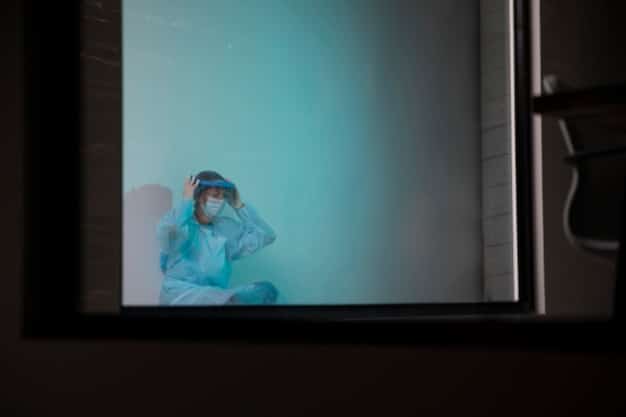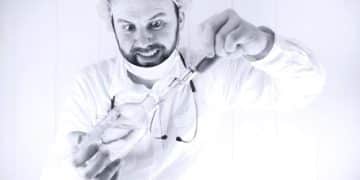Medical Drama Ethics: When TV Doctors Cross the Line in the US

Medical drama ethics are often dramatized on television, but instances such as breaking patient confidentiality, conflicts of interest, and practicing beyond expertise must be carefully examined for real-world consequences.
The thrilling world of medical dramas captivates audiences with high-stakes scenarios and complex characters. But when do the actions of TV doctors cross ethical lines, and what are the real-world implications? Exploring medical drama ethics: When Do TV Doctors Cross the Line? Examining Real-World Consequences is crucial for understanding the impact of these portrayals.
Ethical Boundaries in Medical Dramas: A Closer Look
Medical dramas are a staple of television, offering viewers a glimpse into the fast-paced and often morally ambiguous world of healthcare. These shows frequently depict doctors making difficult decisions, sometimes blurring the lines of acceptable behavior. But how closely do these portrayals reflect real-world ethical standards?
Understanding the ethical boundaries that govern medical practice is essential to evaluating the actions of TV doctors. These boundaries are in place to protect patients and maintain trust in the medical profession.
Informed Consent and Patient Autonomy
One of the fundamental ethical principles in medicine is informed consent. This means that patients have the right to make their own decisions about their care, based on a clear understanding of the potential risks and benefits.
Confidentiality and Privacy
Patient confidentiality is another cornerstone of medical ethics. Doctors are obligated to protect their patients’ privacy and not disclose sensitive information without their consent.
- Breaching patient confidentiality can have serious consequences, both for the patient and the doctor.
- The Health Insurance Portability and Accountability Act (HIPAA) sets strict standards for protecting patient information.
- Medical dramas often use dramatic license when portraying confidentiality, sometimes for the sake of plot development.
Medical dramas often portray situations where doctors grapple with these ethical dilemmas. By examining these scenarios, we can gain a better appreciation for the challenges faced by real-world healthcare professionals.

Common Ethical Dilemmas in Medical Dramas
Medical dramas thrive on conflict, and ethical dilemmas are a rich source of dramatic tension. These shows often explore complex situations with no easy answers, forcing viewers to consider the different perspectives involved.
Several recurring ethical dilemmas appear frequently in medical dramas, reflecting real-world challenges faced by doctors and other healthcare professionals.
Conflicts of Interest
A conflict of interest arises when a doctor’s personal interests could potentially influence their medical judgment. This can include financial incentives, personal relationships, or competing loyalties.
Examples of conflicts of interest in medical dramas might include a doctor owning stock in a pharmaceutical company whose drugs they prescribe, or a doctor treating a family member.
Practicing Beyond Expertise
Another common ethical violation is when doctors practice beyond their area of expertise. This can occur when a doctor attempts a procedure they are not properly trained for, or when they take on cases that are beyond their capabilities.
Medical dramas often depict doctors taking risks to save lives, but these actions can have serious consequences if they exceed their professional boundaries.
Resource Allocation and Triage
In situations where resources are limited, doctors must make difficult decisions about who receives treatment. This is known as resource allocation or triage.
- Triage decisions are often made in emergency situations, such as mass casualty events.
- Factors considered in triage include the severity of the patient’s condition, their likelihood of survival, and the availability of resources.
- Medical dramas often explore the emotional toll of making these difficult choices.
Exploring these ethical dilemmas in medical dramas allows us to grapple with complex moral questions and consider the different perspectives involved. These dramas offer a platform for discussions about what is right and wrong in the medical field.
The Impact of Medical Dramas on Public Perception
Medical dramas are not just entertainment; they also shape public perception of the medical profession. The way these shows portray doctors, hospitals, and medical procedures can influence viewers’ attitudes and expectations.
It’s important to consider the potential impact of these portrayals on patient trust, medical knowledge, and healthcare policy.
The “Hero Doctor” Trope
Many medical dramas rely on the “hero doctor” trope, which depicts doctors as selfless, brilliant, and capable of overcoming any obstacle. While these characters can be inspiring, they can also create unrealistic expectations.
Viewers may come to expect their own doctors to possess superhuman abilities or to always have the perfect solution, leading to disappointment and frustration when faced with the limitations of real-world medicine.
Distorted Medical Knowledge
Medical dramas often take liberties with medical accuracy for the sake of entertainment. This can lead to viewers developing distorted or inaccurate medical knowledge.
For example, medical dramas often portray rare or dramatic cases, which can create a skewed perception of the frequency of these conditions. They can also exaggerate the effectiveness of certain treatments or the ease of diagnosis.
Influencing Healthcare Policy
Medical dramas can also influence healthcare policy by raising awareness of certain issues and sparking public debate.
- Shows that depict the challenges of accessing healthcare, the impact of medical errors, or the ethical dilemmas of new technologies can bring these issues to the forefront of public consciousness.
- This increased awareness can lead to pressure on policymakers to address these issues through legislation or regulation.
- However, it’s important to ensure that these portrayals are balanced and accurate, and that policy decisions are based on evidence rather than purely on entertainment.
Being aware of the potential impact of medical dramas on public perception is crucial for fostering a more informed and realistic understanding of the medical profession.

Real-World Consequences of Ethical Breaches
Ethical breaches in medical dramas may seem like fictional storylines, but they often reflect real-world consequences for both patients and healthcare professionals.
Understanding the potential ramifications of these breaches is crucial to fostering ethical awareness and accountability in the medical field.
Legal and Professional Repercussions
Doctors who violate ethical standards can face legal repercussions, such as lawsuits for medical malpractice or negligence. They can also face professional consequences, such as suspension or revocation of their medical license.
These consequences can have a devastating impact on a doctor’s career and reputation.
Erosion of Patient Trust
Ethical breaches can erode patient trust in the medical profession. When patients feel that their doctors have violated their trust, they may be less likely to seek medical care in the future.
This erosion of trust can have a detrimental impact on public health.
Emotional and Psychological Harm
Ethical breaches can cause emotional and psychological harm to both patients and doctors. Patients may experience feelings of betrayal, anger, or anxiety. Doctors may experience guilt, shame, or burnout.
- The emotional toll of ethical breaches can be significant.
- Support systems and resources are crucial to help both patients and doctors cope with the aftermath.
- Discussing ethical challenges openly and honestly can help to prevent future breaches.
Recognizing the real-world consequences of ethical breaches is essential for promoting ethical conduct in the medical profession and protecting the well-being of patients and healthcare professionals.
The Role of Medical Dramas in Ethical Discussions
Despite their potential for misrepresentation, medical dramas can also serve as valuable tools for sparking ethical discussions. These shows can raise awareness of complex ethical issues, prompting viewers to think critically about the choices faced by healthcare professionals.
By providing a platform for exploring different perspectives and values, medical dramas can contribute to a more nuanced understanding of medical ethics.
Raising Awareness of Ethical Issues
Medical dramas often tackle controversial or sensitive issues, such as end-of-life care, genetic testing, and organ transplantation. By bringing these issues to the forefront, they can raise public awareness and stimulate debate.
These shows can also shed light on the ethical challenges faced by marginalized communities or vulnerable populations.
Promoting Critical Thinking
Medical dramas can encourage viewers to think critically about ethical dilemmas by presenting different perspectives and challenging viewers to consider the potential consequences of different choices.
These shows can also help viewers develop their own ethical frameworks and values.
Facilitating Communication and Empathy
Medical dramas can facilitate communication and empathy by providing a common ground for discussing difficult topics. By watching these shows together, families, friends, and colleagues can explore their own beliefs and values in a safe and supportive environment.
- These discussions can lead to greater understanding and empathy for others.
- Medical dramas can also help healthcare professionals develop their communication skills.
- Role-playing and simulations based on medical drama scenarios can provide valuable experience in navigating ethical dilemmas.
Leveraging the power of medical dramas to spark ethical discussions can promote a more informed and engaged citizenry and contribute to a more ethical healthcare system.
Balancing Drama with Ethical Responsibility
While medical dramas have a responsibility to entertain, they also have a responsibility to portray the medical profession in a way that is both accurate and ethical. Striking this balance can be challenging, but it is essential for maintaining public trust and promoting ethical behavior.
Producers, writers, and actors can take several steps to ensure that their portrayals of medical ethics are responsible and informative.
Consulting with Medical Experts
One of the most important steps is to consult with medical experts to ensure that the medical scenarios and ethical dilemmas depicted in the show are realistic and accurate.
These experts can provide guidance on medical procedures, ethical guidelines, and the potential consequences of different choices.
Presenting Multiple Perspectives
It’s also essential to present multiple perspectives on ethical dilemmas, rather than portraying one viewpoint as inherently right or wrong. This can encourage viewers to think critically about the issues and consider the different values at stake.
Showing the complexities and nuances of ethical decision-making can lead to a more nuanced understanding of the medical profession.
Highlighting the Importance of Ethical Conduct
Medical dramas can also highlight the importance of ethical conduct by showing the positive impact of ethical behavior and the negative consequences of ethical breaches. This can reinforce the value of ethics and encourage viewers to uphold ethical standards in their own lives.
- By showcasing the importance of integrity and compassion, medical dramas can play a positive role in shaping public perceptions of the medical profession.
- In conclusion, medical dramas should strive for a balance between entertainment and ethical responsibility.
- Portraying doctors and healthcare professionals in a way that reflects their commitment to ethical conduct is crucial for maintaining public trust and fostering a more ethical healthcare system.
By taking these steps, medical dramas can fulfill their responsibility to entertain while also promoting ethical awareness and understanding.
| Key Point | Brief Description |
|---|---|
| ⚠️ Ethical Dilemmas | Shows often explore conflicts of interest, practicing beyond expertise, and resource allocation. |
| 👍 “Hero Doctor” | The trope can create unrealistic expectations of medical professionals. |
| 📢 Raising Awareness | Dramas can highlight issues like end-of-life care and ethical challenges. |
| ⚖️ Ethical Responsibility | Shows should consult experts, offer diverse perspectives, and stress ethical conduct. |
Frequently Asked Questions
▼
Medical dramas may show doctors quickly obtaining consent, sometimes overlooking the detailed explanations needed in real life to ensure patients fully understand their options and risks.
▼
A common depiction involves doctors potentially influenced by financial gains, such as prescribing specific medications due to a stake in a pharmaceutical company, compromising patient care.
▼
Yes, by consulting medical experts and ethicists, shows can ensure realistic scenarios and explore multiple ethical viewpoints promoting a more balanced depiction.
▼
These shows often elevate doctors to “hero” status, leading to unrealistic expectations about medical capabilities and outcomes, which can disappoint patients.
▼
They raise awareness about challenges such as resource allocation during crises, end-of-life decisions, and the complexities of patient confidentiality, sparking important public discussions.
Conclusion
Medical dramas, while captivating, often play with ethical boundaries for dramatic effect. Examining these portrayals allows us to consider real-world consequences and understand how ethical breaches impact patients, professionals, and public perception of the medical field.





